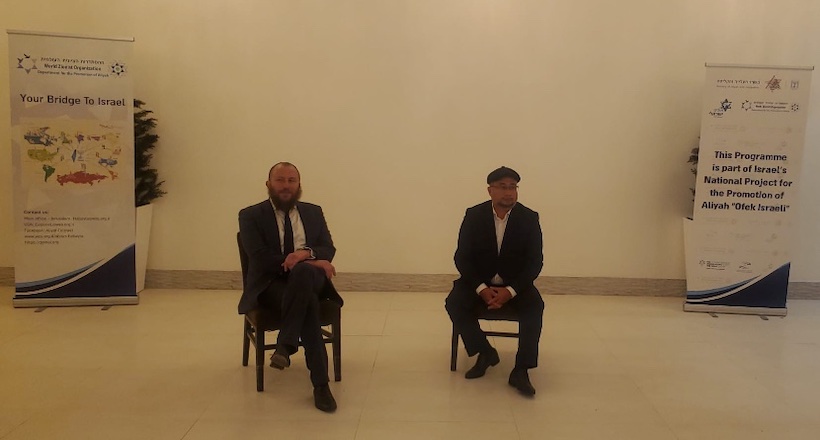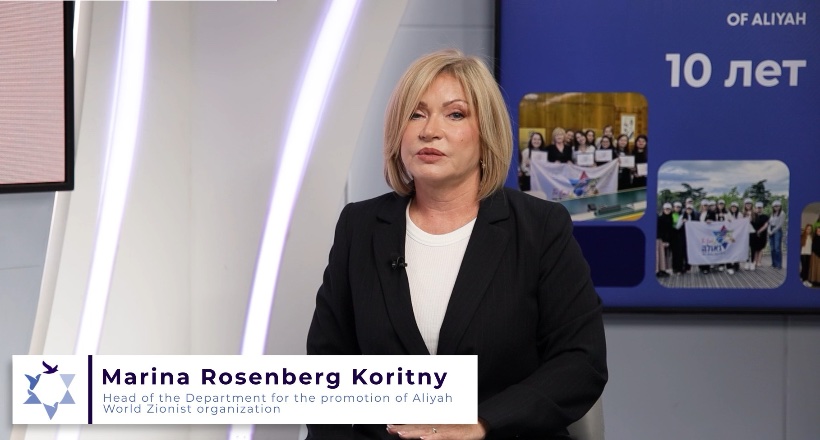Zionism: A Time for Change
Author: Marina Rosenberg Koritny, Head of the Department for the Promotion of Aliyah WZO

On the eve of the 39th World Zionist Congress, we are obliged to speak the truth, no matter how uncomfortable it may be. The Jewish people are experiencing a moment of truth — one that demands not just a correction of course, but a rethinking of the very essence of modern Zionism.
A Double Crisis
After October 7, 2023, Jews of the diaspora faced a situation unseen since World War II. A wave of antisemitism swept across Western countries with such force that Jewish children are afraid to go to school, synagogues have turned into fortresses, and simply wearing a kippah in the street has become an act of civic courage.
We are witnessing politicians openly using anti-Israeli rhetoric to win votes. New York City mayoral candidate Zohran Mamdani declares that he does not recognize Israel as a “Jewish state” and accuses it of genocide. Meanwhile, Hamas’s crimes of October 7 are being deliberately erased from public memory. The larger the share of the Muslim electorate, the more dangerous the situation becomes for Jews — and the louder the anti-Israeli rhetoric sounds at every level of government.
But for the first time in Zionist history, this threat is joined by another — growing doubts about Israel itself as the solution to the Jewish question. A prolonged war with no clear outcome, political chaos, a lack of internal consensus, and a high cost of living — all these add up to the most alarming symptom: a negative migration balance. In 2023, it reached 58,600 people; in the first eight months of 2024, 36,900. Israelis are leaving — and not returning.
This undermines the very foundation of the Zionist idea. How can we persuade a Jew from Paris or London to move to a country that its own natives are leaving? How can we talk about fulfilling the Zionist dream when those who have already fulfilled it are becoming disillusioned?
What No Longer Works
For too long, the Zionist movement has relied on two factors: fear and nostalgia. We expected antisemitism to “push” Jews toward aliyah. We appealed to historical memory and trauma. We said, “You have no choice — only Israel.”
This strategy has exhausted itself. Repatriation out of despair produces unstable aliyah. A person who comes because they are fleeing, not because they are choosing, will leave at the first sign of difficulty. Moreover, the younger generation of diaspora Jews increasingly chooses not Israel, but assimilation. They do not see Jewish identity as a value worth paying a social price for.
We are losing the information war. On university campuses, on social media, and in progressive circles, an anti-Israeli stance has become a marker of moral superiority. Young Jews in the West face a choice: to be a “good progressive person” or to support Israel.
We cannot ignore the economic reality either. Repatriation demands sacrifice. Israel is one of the most expensive countries in the world. Housing is unaffordable. Wages in many professions are lower than in the West. For a successful professional, aliyah means a decline in their standard of living. Without an honest conversation about this, we are doomed to fail.
Repatriation by Conviction
The 39th Congress faces the task of formulating a new paradigm. We must move from repatriation out of necessity to repatriation by conviction. From aliyah driven by fear to aliyah driven by choice. From passively waiting for crises to actively building connection.
This requires systematic work in three main directions.
Spiritual Connection with Israel
It is impossible to love a country you do not know. It is impossible to feel part of a people whose language is foreign to you. Hebrew is not just a means of communication — it is the key to Jewish civilization, a channel of national self-identification, a bridge between generations.
We must create a global network of ulpanim — both physical and online. Learning Hebrew should become the norm for every Jewish child, teenager, and adult. Not necessarily to move to Israel tomorrow, but to feel connected today.
We need long-term educational programs that introduce people to Israeli society in all its complexity. Not propaganda tours, but genuine immersion — through internships, studies, volunteer work, and joint projects. Every Jew in the diaspora should have the opportunity to “experience” Israel before deciding whether to make aliyah.
Cultivating Leadership
Jewish communities in the diaspora need a new generation of leaders — not those who repeat old slogans, but those who can speak to today’s youth in their language, who understand the challenges of postmodern culture, and who can convey the value of Jewish identity without relying solely on Holocaust memory.
Leadership programs must train “ambassadors of Israel” for campuses, media, and social networks — young Jews capable of defending not only Israel’s right to exist but also its complex reality. People who are not afraid to acknowledge Israel’s flaws, yet remain firmly committed to Zionist principles.
Economic Reality
We cannot demand idealism from people without offering practical support. Aliyah should not mean poverty. We need programs for economic adaptation, affordable housing for new immigrants, assistance with credential recognition, and support in employment.
Israeli companies should actively recruit professionals from the diaspora with competitive conditions. We must enable a “soft aliyah” — remote work for Israeli companies, gradual relocation, and maintaining ties with one’s country of origin during the transition.
A Message to Israel
All of this will be meaningless if Israel itself does not become a place people want to move to. We must be honest: the main obstacle to aliyah today is not only the threats facing the diaspora but also the condition of Israel itself.
Political chaos discourages potential newcomers. The absence of internal consensus on fundamental issues creates a sense of instability. The housing crisis makes aliyah economically unrealistic for many families. Bureaucracy turns integration into a nightmare.
If we want aliyah, we must build a country worthy of it. Israel should not be the last refuge of the desperate — it should be the first choice of the inspired.
That means reform. Affordable housing. Effective integration. Investment in education and infrastructure. Combating corruption and bureaucracy. Restoring a civic consensus about what a Jewish and democratic Israel should be.
An Agenda for the Congress
The 39th World Zionist Congress cannot limit itself to declarations. We need a concrete, measurable, and funded action plan.
I propose the following initiatives:
- Creation of a Global Hebrew Study Fund — with a budget to open 100 new ulpanim within three years and develop an online platform for one million users.
- “Young Ambassadors of Israel” Program — annual selection and training of 1,000 young diaspora leaders for work on campuses, in media, and in communities.
- “Soft Aliyah” Fund — support for internships, remote work, and temporary residency programs for those considering aliyah.
- Economic Support Package for New Immigrants — subsidized housing, employment assistance, simplified credential recognition, and tax benefits.
- Monitoring and Accountability System — annual evaluation of program effectiveness with public reporting to Jewish communities.
Each initiative must include specific budget allocations, timelines, and performance indicators.
Last Chance
We risk losing an entire generation. Young Jews in the diaspora are distancing themselves from Israel faster than we can respond. Assimilation is accelerating. Antisemitism is growing — but instead of strengthening ties with Israel, it increasingly leads to a desire to hide one’s Jewishness.
If we continue to act according to old patterns, in ten years the Zionist movement will become a club of nostalgic elders, while a large part of the Jewish people will lose their connection to their roots and to Israel.
The 39th Congress is not just another gathering — it is a turning point. We must choose: either we radically change our approach, or we accept the inevitable fading of the Zionist idea in its classical form.
This choice must be conscious. And it concerns not only Jews in the diaspora choosing between their current homeland and Israel — it concerns us, the participants of this Congress. We must consciously choose the future we are ready to fight for — a future where aliyah is not an escape but a homecoming; not an act of desperation, but the fulfillment of a dream.
Zionism has always been a revolutionary idea. Now it is time for a new revolution — a revolution of conscious choice, deep connection, and genuine return.
We have the tools. We have the people. We understand the problem.
Do we have the will to act?
We will find out in Jerusalem, October 28–30.





